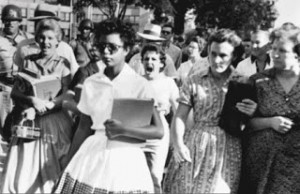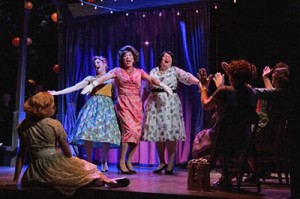 “What I think is the really dangerous approach is the ‘let’s be artistic’ attitude. I know that artistry just happens.”
“What I think is the really dangerous approach is the ‘let’s be artistic’ attitude. I know that artistry just happens.”
Fred Astaire, Steps in Time (courtesy of Patrick Kurp)
Terry Teachout on the arts in New York City
 “What I think is the really dangerous approach is the ‘let’s be artistic’ attitude. I know that artistry just happens.”
“What I think is the really dangerous approach is the ‘let’s be artistic’ attitude. I know that artistry just happens.”
Fred Astaire, Steps in Time (courtesy of Patrick Kurp)
In today’s Wall Street Journal I report on two Chicago-area musical productions, TimeLine Theatre’s Juno and Writers’ Theatre’s Days Like Today. Here’s an excerpt.
* * *
Marc Blitzstein’s theatrical career was launched with the big bang of “The Cradle Will Rock,” the pro-labor agitprop musical whose 1938 premiere came close to starting a riot. He never succeeded in building on his youthful triumph, though: “Regina,” his operatic version of “The Little Foxes,” ran for a paltry 56 performances, and “Juno,” in which Blitzstein took on the even more formidable challenge of carving a Broadway musical out of Sean O’Casey’s “Juno and the Paycock,” was an even bigger flop that closed in just under two weeks. Nor has it ever been successfully revived, in New York or anywhere else, which makes TimeLine Theatre Company’s new production of “Juno” important by definition….
 The troubles with “Juno” are twofold. If you saw the Irish Repertory Theatre’s flawless 2013 revival of “Juno and the Paycock,” you won’t need to be reminded that O’Casey’s shatteringly black comedy about a ne’er-do-well braggart (played here by Ron Rains) and his despairing wife (Marya Grandy), is one of the greatest plays to come out of Ireland. Unfortunately, Joseph Stein’s book is so faithful to its source that “Juno” feels more like a play with music than a genuinely original show. In addition, Blitzstein’s songs, “For Love” and “I Wish It So” excepted, lack the expressive weight that so powerful a play demands. As a result, you come away wondering why he chose to write a traditional musical (albeit one with an unhappy ending) instead of giving “Juno and the Paycock” the full-fledged operatic treatment for which it cries out.
The troubles with “Juno” are twofold. If you saw the Irish Repertory Theatre’s flawless 2013 revival of “Juno and the Paycock,” you won’t need to be reminded that O’Casey’s shatteringly black comedy about a ne’er-do-well braggart (played here by Ron Rains) and his despairing wife (Marya Grandy), is one of the greatest plays to come out of Ireland. Unfortunately, Joseph Stein’s book is so faithful to its source that “Juno” feels more like a play with music than a genuinely original show. In addition, Blitzstein’s songs, “For Love” and “I Wish It So” excepted, lack the expressive weight that so powerful a play demands. As a result, you come away wondering why he chose to write a traditional musical (albeit one with an unhappy ending) instead of giving “Juno and the Paycock” the full-fledged operatic treatment for which it cries out.
So why see “Juno” now? Because Mr. Bowling’s focused, intimate small-scale staging minimizes its palpable problems—and because Ms. Grandy’s quietly determined interpretation of the title role is as moving in its own way as was J. Smith-Cameron’s towering performance in the Irish Rep revival of the play….
Broadway musicals, like Hollywood movies, rarely seek to portray contemporary middle-class urban adult life in anything like a straightforward way. Stephen Sondheim showed how to do it with “Company,” but that 1970 hit has had few successors. Indeed, the only Broadway shows to come along in recent years that cover remotely similar ground are “If/Then” and “Next to Normal,” both of which I found to be prettified and narcissistic. So I’m happily surprised to report that Writers’ Theatre, which gave us “A Minister’s Wife” in 2009, has now premiered a second chamber musical, “Days Like Today,” that does what “If/Then” purports to do, and does it with immensely promising originality….
* * *
Read the whole thing here.
Emily Berman sings “Where There Was Bone,” a number from Days Like Today:
 Louis Armstrong rarely spoke out in public about civil rights, or any other political matter. In September of 1957, though, he denounced the racial situation in Little Rock, where Orval Faubus, the governor of Arkansas, had ordered the National Guard to surround Central High School in order to prevent nine black children from enrolling there. Even when the guardsmen were joined by a threatening mob of white segregationists, President Eisenhower initially refused to take action to enforce Brown v. Board of Education, the 1954 Supreme Court decision ordering the desegregation of the public schools.
Louis Armstrong rarely spoke out in public about civil rights, or any other political matter. In September of 1957, though, he denounced the racial situation in Little Rock, where Orval Faubus, the governor of Arkansas, had ordered the National Guard to surround Central High School in order to prevent nine black children from enrolling there. Even when the guardsmen were joined by a threatening mob of white segregationists, President Eisenhower initially refused to take action to enforce Brown v. Board of Education, the 1954 Supreme Court decision ordering the desegregation of the public schools.
Armstrong was playing at the time in Grand Forks, North Dakota. Three days after Eisenhower met with Faubus, the trumpeter was interviewed there by Larry Lubenow, a local journalism student and part-time newspaper reporter. Lubenow asked him about Little Rock, and promptly wrote up Armstrong’s blunt, outspoken response for the Grand Forks Herald. His story was picked up by the Associated Press and appeared in newspapers all over the world:
Trumpet player Louis Armstrong said last night he had given up plans for a Government-sponsored trip to the Soviet Union because “the way they are treating my people in the South, the Government can go to hell.”
Here for a concert, Mr. Armstrong said President Eisenhower had “no guts” and described Gov. Orval E. Faubus of Arkansas as an “uneducated plow boy.”
He said the President was “two-faced” and had allowed Governor Faubus to run the Federal Government.
“It’s getting almost so bad a colored man hasn’t got any country,” the Negro entertainer said.
Armstrong’s statement, and the controversy that arose from it, makes for one of the most revealing episodes in a long and endlessly fascinating life. Accordingly, I described it in considerable detail in Pops: A Life of Louis Armstrong, my 2009 biography, drawing on a wide range of primary and secondary sources, and it later became the basis for one of the most widely remarked scenes in Satchmo at the Waldorf, my one-man play about Armstrong and his life.
While I was working on Pops, an important new source became available: Larry Lubenow himself, who had long since left journalism and was living in Cedar Park, Texas. (He died there earlier this month.) David Margolick tracked him down in Texas and interviewed him, and on September 23, 2007, fifty years after Armstrong spoke out about Little Rock, Margolick published an op-ed piece in the New York Times called “The Day Louis Armstrong Made Noise” in which he retold the tale from Lubenow’s point of view, supplying previously unavailable details about the encounter. It was an amazing find, one of the most significant pieces of Armstrong-related research in the years since the trumpeter’s death.
 Because Margolick’s story was published in a family newspaper, he used a fairly transparent euphemism to describe the colorful language that Armstrong had actually used to describe Faubus and John Foster Dulles, Eisenhower’s secretary of state. (If you’ve read Pops or seen Satchmo at the Waldorf, you know what he really said.) Margolick had interviewed Lubenow a few days earlier in a public presentation sponsored by New York’s Louis Armstrong House Museum and Archive, so I got in touch with Michael Cogswell, who runs the museum, and asked him to put me directly in touch with Lubenow. Cogswell gave me Lubenow’s e-mail address, and I wrote to him to confirm, among other things, that Armstrong had in fact used the “double-barreled hyphenated expletive” (it was a favorite of his) that I assumed he had used. He wrote back to assure me that I’d guessed right.
Because Margolick’s story was published in a family newspaper, he used a fairly transparent euphemism to describe the colorful language that Armstrong had actually used to describe Faubus and John Foster Dulles, Eisenhower’s secretary of state. (If you’ve read Pops or seen Satchmo at the Waldorf, you know what he really said.) Margolick had interviewed Lubenow a few days earlier in a public presentation sponsored by New York’s Louis Armstrong House Museum and Archive, so I got in touch with Michael Cogswell, who runs the museum, and asked him to put me directly in touch with Lubenow. Cogswell gave me Lubenow’s e-mail address, and I wrote to him to confirm, among other things, that Armstrong had in fact used the “double-barreled hyphenated expletive” (it was a favorite of his) that I assumed he had used. He wrote back to assure me that I’d guessed right.
After consulting the tape of the Lubenow-Margolick interview, I incorporated what I’d learned into my account of what happened in 1957. Since the public interview and my own e-mail exchange with Lubenow were the primary sources for this part of my account, I summarized what I’d done as follows in my first source note:
A journalism student: Larry Lubenow, personal communication. Lubenow spoke for the first time in public about his interview with LA [i.e., Louis Armstrong] on Sept. 18, 2007, in a presentation sponsored by AA [i.e., the Louis Armstrong House Museum and Archive]. This account is based in part on the presentation.
I then cited in later notes the many contemporary newspaper accounts on which I also drew.
What is missing from this source note? David Margolick’s name, of course. Failing to mention him was an unintentional and innocent oversight, but I realize in retrospect that I should have done so, since it was Margolick who found Larry Lubenow, obtained his version of the encounter, and made it part of the historical record, subsequently incorporating the story into an important 2011 book about the Little Rock crisis called Elizabeth and Hazel: Two Women of Little Rock.
My mistake was, to be sure, a tiny one, but an important one, enough so that Margolick got in touch with me and with Houghton Mifflin Harcourt, the publishers of Pops, asking that it be rectified. We agreed to change the source note in the second printing of the paperback edition of Pops.
Alas, there hasn’t been one yet—the first printing has yet to sell out—and so the mistake remains unfixed. Margolick now thinks that we shouldn’t wait until the second printing, which is scheduled to take place some time next year, to correct my error. I agree.
I trust that nobody who read Pops in 2009 assumed that I was the person who originally tracked down Larry Lubenow. In fact, every Louis Armstrong scholar in the world was already well aware of Margolick’s discovery, since he published it on the op-ed page of the New York Times, which is widely circulated, two years before Pops came out. But I wouldn’t want anyone to suppose that I’d been trying to claim retrospective credit for what he did, and I deeply regret any impression to the contrary that may have been made by my original source note.
If you’re not a scholar, this may seem like a great deal of fuss to make over a couple of missing words in a footnote. But when it comes to the historical record, such words, as Mark Twain famously put it, sometimes constitute “the difference between the lightning-bug and the lightning.” Since its publication five years ago, Pops has been widely accepted as the standard biography of Louis Armstrong. I’m proud of that achievement, and it’s important to me to ensure that everyone who helped make it possible receives proper credit. Chapter 11 of Pops wouldn’t have been the same without David Margolick. I sincerely apologize for having neglected to specifically credit him by name in my source notes, and I can assure him—and you—that all future printings of Pops will do so.
Here’s my list of recommended Broadway, off-Broadway, and out-of-town shows, updated weekly. In all cases, I gave these shows favorable reviews (if sometimes qualifiedly so) in The Wall Street Journal when they opened. For more information, click on the title.
BROADWAY:
• Bullets Over Broadway (musical, PG-13, reviewed here)
• Cabaret (musical, PG-13/R, all performances sold out last week, closes Jan. 4, reviewed here)
 • Casa Valentina (drama, PG-13, closes June 29, reviewed here)
• Casa Valentina (drama, PG-13, closes June 29, reviewed here)
• The Cripple of Inishmaan (serious comedy, PG-13, reviewed here)
• A Gentleman’s Guide to Love & Murder (musical, PG-13, all performances sold out last week, reviewed here)
• Matilda (musical, G, nearly all performances sold out last week, reviewed here)
• Les Misérables (musical, G, too long and complicated for young children, most performances sold out last week, reviewed here)
• Of Mice and Men (drama, PG-13, nearly all performances sold out last week, reviewed here)
• Once (musical, G/PG-13, reviewed here)
• A Raisin in the Sun (drama, G/PG-13, all performances sold out last week, reviewed here)
• Rocky (musical, G/PG-13, reviewed here)
OFF BROADWAY:
• The Fantasticks (musical, G, suitable for children capable of enjoying a love story, reviewed here)
IN EAST HADDAM, CONN.:
• Damn Yankees (musical, G, closes June 21, reviewed here)
CLOSING SOON IN CAMBRIDGE, MASS.:
• The Tempest (Shakespeare, G, closes June 15, reviewed here)
CLOSING SOON ON BROADWAY:
• Act One (drama, G, too long for children, closes June 15, reviewed here)
CLOSING NEXT WEEK IN CHICAGO:
• M. Butterfly (drama, PG-13, closes June 8, reviewed here)
CLOSING NEXT WEEK IN WASHINGTON, D.C.:
• Henry IV, Parts One and Two (Shakespeare, PG-13, playing in rotating repertory, closes June 7 and 8, reviewed here)
CLOSING NEXT WEEK OFF BROADWAY:
• A Loss of Roses (drama, PG-13, closes June 7, reviewed here)
 From time to time I appear on Theater Talk, the long-running TV series in which Susan Haskins, Michael Riedel, and their guests survey the New York theater scene. In this week’s episode, I discuss the Broadway season just past in the company of two of my colleagues, Ben Brantley of the New York Times and Peter Marks of the Washington Post. As usual, we had fun talking about the shows we liked—and loathed.
From time to time I appear on Theater Talk, the long-running TV series in which Susan Haskins, Michael Riedel, and their guests survey the New York theater scene. In this week’s episode, I discuss the Broadway season just past in the company of two of my colleagues, Ben Brantley of the New York Times and Peter Marks of the Washington Post. As usual, we had fun talking about the shows we liked—and loathed.
The episode will air on New York’s Channel 13 at one a.m. on Saturday (i.e., late Friday night). It will then be replayed on CUNY-TV throughout the weekend and on Monday, after which it will be archived for web-based viewing. I’ll link to it then.
For more information, including other air times in the New York area, go Theater Talk.
Take a look.
 From the 1954 film version of New Faces of 1952, Alice Ghostley performs Sheldon Harnick’s “Boston Beguine,” which she also performed in the original Broadway production:
From the 1954 film version of New Faces of 1952, Alice Ghostley performs Sheldon Harnick’s “Boston Beguine,” which she also performed in the original Broadway production:
(This is the latest in a series of arts-related videos that appear in this space each Monday and Wednesday.)
| M | T | W | T | F | S | S |
|---|---|---|---|---|---|---|
| 1 | 2 | 3 | ||||
| 4 | 5 | 6 | 7 | 8 | 9 | 10 |
| 11 | 12 | 13 | 14 | 15 | 16 | 17 |
| 18 | 19 | 20 | 21 | 22 | 23 | 24 |
| 25 | 26 | 27 | 28 | 29 | 30 | |
An ArtsJournal Blog